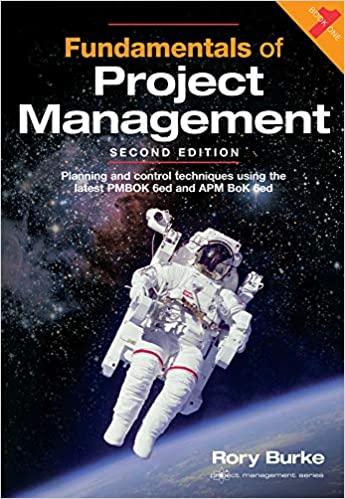Question
1. Identify, define and apply two motivation theories (Excluding Maslow) in order to discuss the causes of poor motivation (primary problems) in the case. If
1. Identify, define and apply two motivation theories (Excluding Maslow) in order to discuss the causes of poor motivation (primary problems) in the case.
- If you are asked to define or, discuss or explain a theory - fully definethe key components.
- For example, with Expectancy E>P + P>O + Valence would all need to be identified and explained.
Case Study: Worn Out
You are listening to a long-standing senior employee (Larry) of Occies talk about his time at the company. Occies was an old name in the Australian clothing industry. Started by its founder Kenneth Backman back in the late 1980s, the surfing apparel label rode a wave of popularity due to its popular designs and clever promotion strategies. Larry said, "In the early days Kenneth was amazing.... I remember early on when the retailers had never heard of us that nobody wanted to stock our merchandise. So, Kenneth talked to all his surfing friends and asked them to go into these shops and ask if they stocked Occies. Pretty soon we were getting calls from retailers saying 'we can't believe how many enquiries we're getting for your product... can we please see some samples?' and '...how soon can you deliver?'" Larry noted Kenneth always knew what needed to be done in the early years of the firm. He was young himself which meant he was targeting the same age group he was part of. It was good product development informed by 'knowing the market' and some hard work with retailers that helped to build their success. Larry continued his account of the early years of Occies for some time, obviously proud about the part he had played in its success. However, it wasn't long before some of the company's more recent problems became the focus and his tone changed. Unfortunately, times got tougher for Occies and a number of factors created a situation which threatened Occies's survival. Growing consolidation in retailing meant larger clothing retailers had the capacity to make greater demands of labels like Occies. Small repeat orders were a thing of the past and Kenneth had to borrow heavily to invest in the plant and equipment needed to meet these larger orders. This was sometimes done by buying out other apparel manufacturers. Eventually he had to turn to licensed clothing manufacturers in Southeast Asia to make many of his designs, as he simply could not increase local production quickly enough. By 2015, Occies had grown in many ways. The company had over 2000 employees in Australia alone, with roughly a third in the production facility in Melbourne, while the others worked in areas such as Retailing, Marketing, Accounts and Product Design. The brand was also into new product lines like sunglasses and watches which was a complete departure from their traditional focus of clothing apparel. Through much of this change, Larry had been working in product design and had been its senior manager for just over five years. He now reflected sadly on how his time there was nearing an end, as he seemed almost certain there was little hope of him continuing. He said regretfully, "There was a time we knew what the market wanted so you could say design was one of our distinctive competencies. That's no longer the case and we just aren't getting the orders needed to cover the debt repayments for our heavy borrowing over the last ten years." Larry now lamented that Kenneth seemed unable to let his product development team do their jobs effectively. Every time new designs to cater for changing customer tastes were presented, Kenneth made large changes, which led to many designers resigning. 3 Larry said, "We have some talented designers that love the creative side of their work. They live to make clothing apparel Millennials and Generation Z want and work carefully with production crews to refine the product. They're much more tuned into what the market wants than we are, and they want more control over decision making. We also get substantial bonuses for profits and have shares in the company so there is a personal financial impact when Kenneth steps in and sidelines this expertise. The salary here is good but, many look forward to the end of year bonuses and really miss them now they can't be paid." He then added, "Kenneth had his finger on the pulse once and when he did things were great. That hurts us more now as we've become a big operation with substantial offshore production and multiple product lines. We're not getting quality out of our offshore licensed manufacturers because Kenneth had to have a major hand in negotiating supply contracts himself with only the help of an old friend. While his friend had a legal background, he's not experienced in the industry or in dealing with offshore operations and because of this we now quality problems. It is these quality problems and the lack of interest by young buyers that is hurting the company." These sentiments were also substantially supported by staff opinion surveys done by the Human Resources Department. Larry was certain he won't see the year out and after putting his resume online, he had a couple of very interesting offers. He told you he will be handing in his resignation soon.
Step by Step Solution
There are 3 Steps involved in it
Step: 1

Get Instant Access to Expert-Tailored Solutions
See step-by-step solutions with expert insights and AI powered tools for academic success
Step: 2

Step: 3

Ace Your Homework with AI
Get the answers you need in no time with our AI-driven, step-by-step assistance
Get Started


